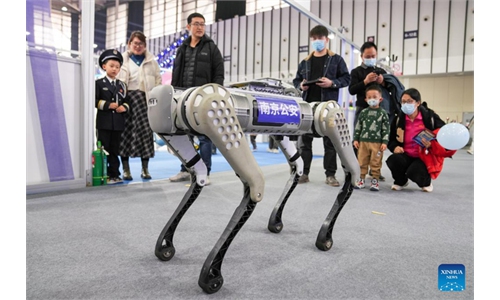
Photo: VCG
China will strive to modernize the industrial system and develop new quality productive forces at a faster pace, according to the Government Work Report submitted to the second session of the 14th National People's Congress on Tuesday, as part of the major tasks for the economic and social development of the world second largest economy in 2024.
The report listed several tasks, including industry and supply chain improvement and upgrading, and the cultivation of emerging sectors and future-oriented industries such as hydrogen power and new materials. Innovative development of the digital economy will be promoted, with an AI-Plus initiative to be launched, according to the Xinhua News Agency.
Experts said that the moves showed the determination of the Chinese government in deepening reform and further opening-up while achieving greater self-reliance and strength in science and technology, which is the core for the nation's development of new quality productive forces.
Technological innovation will maintain the competitiveness of China's industry and supply chains, particularly in high-end and booming industries such as new energy and the digital sector, while making breakthroughs in some key areas like manufacturing of advanced chips amid the technology crackdown by the US, experts said.
The Chinese government will vigorously advance new industrialization, make more breakthroughs in core technologies in key fields, promote coordination between innovation chains and industry chains, and drive forward industrial innovation through technological innovation, according to a report submitted by the National Development and Reform Commission (NDRC), the top economic planner, on Tuesday to the national legislature for deliberation.
New growth drivers and new strengths will be fostered and expanded to keep raising productivity, the NDRC's report said.
In order to do that, a score of major tasks need to be conducted. Among these are improving the nation's capacity for scientific and technological innovation; accelerating the transformation and upgrading of traditional industries; fostering emerging and future industries; promoting the further integration of the digital and real economies; spurring the development of modern services, and speeding up the building of a modern infrastructure system, according to the NDRC's report.
As part of this effort, the central government has pledged to allocate 370.8 billion yuan ($51.51 billion) for science and technology in 2024, an increase of 10 percent, with a focus on basic research, applied basic research, and national strategic tasks in science and technology, it says in a separate report on budgets submitted by the Ministry of Finance.
The government reports also reviewed key achievements made in 2023, which have provided a solid foundation to facilitate development of new quality productive forces.
In 2023, the government vigorously pursued innovation-driven development, and China's self-reliance and strength in science and technology improved markedly, the NDRC's report said.
Spending on research and development (R&D) reached 3.32782trillion yuan, an increase of 8.1 percent, accounting for 2.64 percent of China's GDP, the NDRC's report said.
Experts said that the government reports submitted on Tuesday demonstrates the government's commitment and determination to achieve high-quality development, while the promotion of scientific and technological innovation serves as a crucial means to achieve this goal.
As China enters a new stage of development, attention is increasingly focused on new quality productive forces that can support high-quality growth, which is reflected in the government reports today, Zhou Hongchun, a professor with the Development Research Center of the State Council, the cabinet, told the Global Times on Tuesday.
China is undergoing industrial transformation, which fundamentally involves shifting from traditional production factors to new drivers, the expert said.
Explaining this trend, Zhou said that previously, the economy mainly relied on real estate and infrastructure. But now, as major projects are completed nationwide, urban development hinges on heightened productivity and efficiency, underscoring the crucial role of technology innovation.
In recent years, developed countries led by the US have increasingly sought to constrain China's development in technology, highlighted by high-end chips.
In the face of the intensified US moves, China's technological innovation needs to be primarily self-reliant in order to ensure that its industry and supply chains remain globally competitive while curbing disruption by the US, Ma Jihua, a veteran telecom observer, told the Global Times on Tuesday.
In recent years, China has made significant investments in technology, which is reflected by the rising numbers of high-tech talent, contracts and patents in the field. In 2023, there were 950,000 technology contracts signed, with a transaction volume reaching 6.15 trillion yuan, marking a 28.6 percent increase year-on-year, Minister of Science and Technology Yin Hejun said on Tuesday.
Moreover, the number of authorized invention patents reached 921,000, a rise of 15.3 percent year-on-year.
China's advances in the new-energy vehicle sector provide a good example of productivity in high-quality sectors. With more government support and active business participation in the innovation and application of advanced technologies, the nation's industry will rise to a higher level, boosting the development of new quality productive forces, Ma said.



